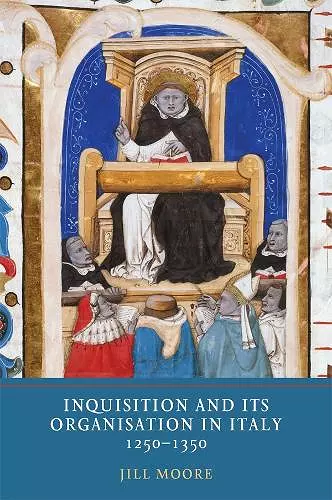Inquisition and its Organisation in Italy, 1250-1350
Format:Hardback
Publisher:York Medieval Press
Published:17th May '19
Currently unavailable, and unfortunately no date known when it will be back

A strikingly original approach to the inquisition movement in Italy, examining the roles of the protagonists. Inquisition against heresy in Italy was a partnership between the papal inquisitor, usually a Dominican or Franciscan friar, the local bishop and the civic authority; and it is generally considered that the inquisitor was the leading figure, from the mid thirteenth century onwards. This book seeks to question whether this is true. Through an examination of the roles of the different partners, and in particular the part played by the lay and clerical staffof the inquisition, it offers a much more diverse picture, arguing that the inquisitor was often supplicant rather than dominant, and the civil authority continued to play a major part. Dominicans and Franciscans took different approaches to inquisition, and related in different ways to their parent orders. Drawing on a wealth of unpublished sources, the book analyses these divergences, and shows the internal operations of the inquisition. It also teases out the lives and histories of the individuals who spent their careers working for the inquisition - notaries, messengers, spies and many more - and shows how inquisition against heresy was part of the civic fabric of the Middle Ages. JILL MOORE gained her PhD at Birkbeck, University of London.
[T]his book shows very convincingly that the medieval Inquisition, in Italy, was a proper institution, despite local differences in its organisation; the interdependence between it and other authoritative organisations, far from being a weakness, became functional for its successful development between the 13th and 14th centuries. Inquisition and its Organisation in Italy paves therefore many new avenues for the exploration of the daily business of the medieval inquisition, and will be useful also for scholars working on other aspects of the communal society. -- Lidia Domingues * The Medieval Review *
[A] well-researched and valuable contribution to the fields of late medieval religion, church history, Italian history, the mendicant orders, and inquisition. The breadth and depth of primary source research that result in the chapters' detailed examples is laudable. -- Janine Larmon Peterson * Speculum *
Henry Charles Lea is the standard by which all studies of the inquisition are measured. His epochal work was brilliant, immense, and frequently definitive. In an important essay, Richard Kieckhefer argued there was no such thing as 'the Medieval Inquisition'. While acknowledging their acumen and contributions, Jill Moore challenges both scholars. Her revisionist monograph is a significant achievement. Where Lea tackled the subject on a European scale and Kieckhefer sought to correct a misapprehension, Moore limited herself to a century of medieval history in Italy. In this way she succeeds in delving deeply into archival materials where she examines the mechanics of inquisitorial activities. -- Thomas A. Fudge * Parergon *
ISBN: 9781903153895
Dimensions: unknown
Weight: 636g
314 pages